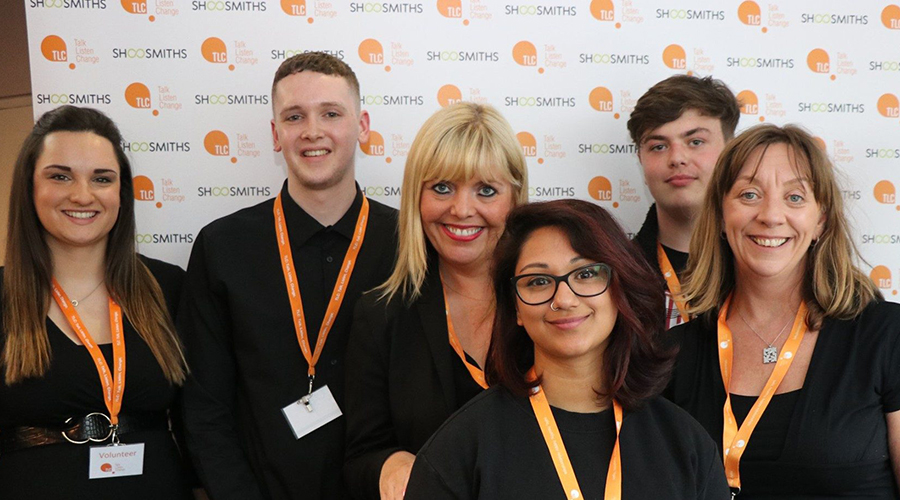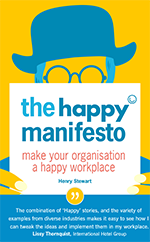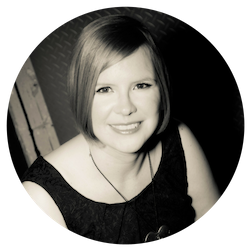How Michelle Hill Has Maintained TLC's Culture Whilst Growing
"We're a relationship charity, and we want to invest as much time in our team and their relationships at work as we do with our clients," says Michelle Hill, CEO of TLC: Talk, Listen, Change. "We want them to have a workplace where they feel valued and where they want to do their best work. I think the more we invest in wellbeing and the team being happier, the better the results are."
Michelle will be speaking at the 2024 Happy Workplaces Conference about maintaining your organisation's culture whilst growing.
Hi, we are Happy
We are leading a movement to create happy, empowered and productive workplaces.
How can we help you and your people to find joy in at least 80% of your work?

Michelle Hill is founder and CEO of TLC: Talk Listen Change. TLC is a relationships charity, delivering a range of integrated support, therapies and programmes in pursuit of happy and healthy relationships. Michelle has created a happy and engaged workplace based on a culture of coaching, Pre-Approval, and building relationships.
As an organisation grows, it can be difficult to ensure that everyone is aligned with the same values and goals. This can lead to a lack of cohesion and a sense of disconnection amongst team members. Michelle has been working with teams across TLC to ensure that everyone feels involved, following rapid growth over the last few years.
"At the end of last year and beginning of this year, I spent a period of time meeting everybody in the organisation individually," says Michelle. "It was the highlight of my day, every day – just the opportunity to connect with people, find out what drives them, why they work for TLC, what matters to them. It was definitely the most inspiring thing I've done in the last 12 months."
A group of staff across the organisation have a working group that makes suggestions and leads change on things they should be doing differently.
So far, this has included defining what TLC's soft survey looks like, what soft communication looks like, and letting the senior leadership team know what TLC does well – and what it could do better.
TLC has several staff networks for people with protected characteristics, and they have also made recommendations and changes.
"They are both a safe space for people in the organisation, but also somewhere that that group of people in that network can lead the organisation," says Michelle. "They can challenge us on what we need to do better, can hold us right down and suggest things that we need to do. But they are pre-approved with a remit that anything within their perspective characteristic they can challenge and lead on."
For example, the disability group has led massive changes to TLC's staff sickness policy. The people of colour group has adopted the Halo code, around people being encouraged to wear their hair in their own cultural style.
"One of our sayings is around people bringing their whole self to work. And as one of our values is being authentic, and as a relationship charity, we want to invest as much time in our team and their own relationships at work as we do in our clients. We want our staff to have a workplace where they want to be valued and they want to do their best, and I think the more we invest in wellbeing and the team being happier, the better the results are."
Michelle is certain that implementing self-managing teams, fostering a culture of coaching people and Pre-Approval has resulted in huge growth at TLC.
"The growth in the last few years in terms of the number of people we work with, the people we support, and the areas we serve has just been phenomenal. But so much is led by the team and we've got people who have been with us all the way through the journey in lots of different roles and lots of different stages.
"We've made mistakes, but hopefully we're open about that and learn from them, and don't shy away from them – because you can't take some risks without getting some things wrong.
"There's definitely a direct correlation between people feeling like they are shaping what the organisation does and what it stands for and the results that we have. It's not a casual link."
Michelle Hill will be speaking on how to maintain your organisation's culture whilst growing at the 2024 Happy Workplaces Conference on Wednesday 15th May. This year's conference is a hybrid event, held both Live Online via Zoom and in the classroom at Happy. However you choose to join us, there will be plenty of interaction, discussion, space for reflection and opportunities to network with others.
Related resources
- How to Create and Maintain a Strong Culture in a Growing Team — Michelle was a guest on The Happy Manifesto Podcast in October 2023. Listen to this episode on The Happy Manifesto website, or wherever you get your podcasts.
- Pre-Approval in Practice at TLC: Talk, Listen, Change — Michelle talks about how TLC's Marketing Officer was Pre-Approved to create their new website in this two-minute video from the 2017 Happy Workplaces CEO Conference.
- Case Study — TLC: Talk, Listen, Change — all of TLC's frontline managers and aspiring leaders have attended the Happy Leadership Programme and one of the senior team has been on Happy's Level 7 programme. Find out what impact it's had in this case study.
- Creating a Culture of Leadership Development — At Next Jump, the focus has been on building a culture through which decision-making can be taught. Find out more in this video from the 2017 Beyond Budgeting Conference.
- Our Next Level 7 Programme for Senior Leaders Starts in September — Our Level 7 Senior Leadership Apprenticeship programme, the equivalent of a post-graduate degree or MBA, is focused on people and how you create trust-based organisations where people can truly fulfil their potential.
Keep informed about happy workplaces
Sign up to Henry's monthly Happy Manifesto newsletter, full of tips and inspiration to help you to create a happy, engaged workplace.

Learn the 10 core principles to create a happy and productive workplace in Henry Stewart's book, The Happy Manifesto.

Claire Lickman
Claire is Head of Marketing at Happy. She has worked at Happy since 2016, and is responsible for Happy's marketing strategy, website, social media and more. Claire first heard about Happy in 2012 when she attended a mix of IT and personal development courses. These courses were life-changing and she has been a fan of Happy ever since. She has a personal blog at lecari.co.uk.
Next Conference: 2025 Happy Workplaces Conference
Our Happy Workplaces Conference is our biggest event of the year, and we'd love for you to join us on Thursday 12th June!
This year's event will be held at Happy's HQ in Aldgate, central London.
We may also offer a hybrid option for people to join us online simultaneously — do let us know if you are interested in joining online and we can add you to the waiting list.
As always, our next conference will be filled with interaction, discussion and space for reflection.
Related courses
The Happy Leadership Programme
Brave Leadership: One-Year Leadership Development Programme for Women
Level 7 Senior Leadership Apprenticeship Programme
Not what you need? Take a look at all of our off-the-shelf Leadership and Management programmes.